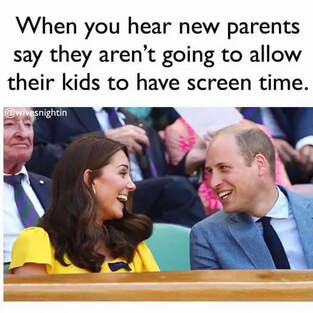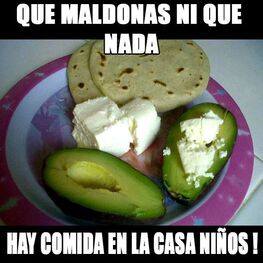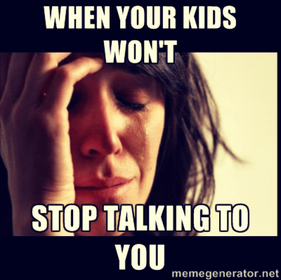 I would like to say that I am totally against screen time regarding my children, but I am not. I use it daily but with a purpose. And I guess that’s the key word here, purpose. My parents also used my screen time with a purpose. The TV was my baby sitter, my teacher and my friend. I grew up in front of the TV and learned how to speak English with a Valley Girl accent thanks to a cartoon called Beverly Hills Teens. The TV also taught me about American popular culture. Family sitcoms taught me valuable lessons on friendship, saying no to drugs, the concept of stranger danger, you know, all of the things my parents should have been inculcating into my every day upbringing, but were not around to do. Programs on PBS taught me math and science and showed programs about the arts which I was very passionate about. TV taught me pretty much everything I would need in order to assimilate, and assimilate I did. American television did such a good job, that later I had to do the same thing in reverse and sought out what was accessible on Spanish language Television in order to learn how to be Latina. Telenovelas, the only programming I found that featured adolescents that I could relate to on the Spanish language channels, taught me Spanish as well as Latin cultural ideals. I use TV with a purpose now as well. Every day, my kids have movie time with Grandma, but there is one rule: they have to watch a movie in Spanish with Spanish subtitles. I am implementing the TV as a language learning tool as well as a way for them to socialize with their grandma who happens to be 80 years old and has some limitations. To be honest, they have the best time together, it gives the kids something to talk about and bond over with their grandma, and most importantly, it releases some of the pressure off of me to be sole language teacher in the house. My big generalization is that our mothers didn’t worry about screen time in the same way we do because there were not that many screens around, or so much content created by people who were not being regulated. The TV was just always on. What was your relationship with TV as a kid? Do you monitor your child's screen time more or less than your parents? We’re you monitored at all? Do you think the perils of screen time are over rated? Would love to hear from you! XO, Wendy
0 Comments
 My mother has a lot of food related chronic disease. She is a diabetic, has hyper-tension, and most recently, only has about ten percent of kidney function left. She goes to at least four different Doctors every month and takes medication all day long. She has been on a very strict diet for years: no sugar, no salt, only 4oz of protein a day, and little to no potassium which limits so many of the delicious fruits and veggies we all love. Had she been on a healthy diet, one that included fruits and veggies and maybe some form of exercise in middle age, had she had a better connection with her body, or not been so ignorant on nutrition, she may have been able to avoid all of these ailments. Here is the irony in all of this. My mother worked in the food industry, yet knew nothing of the science behind the food she was serving. She cooked for a living for over 20 years and yet, would only cook for her family on the weekends. She was an organized expediter in her professional kitchen, yet could not get it together to organize how she and her family could eat a healthier diet. I ate way too many sandwiches, way too much fast food and soda as a child and it was not okay. My body knew it wasn’t okay to the point trying to become a vegetarian at 14 and asking for “comida verdadera," or real food, daily. But alas, one cannot live off of white rice or iceberg lettuce alone, which is all that was in my house when I was trying to be a vegetarian with no income of my own for better groceries. My food journey has been a long one filled with lots of reading about nutrition, trying out different culinary lifestyles, and eating. Lots of good eating. I have been vegetarian, vegan, pescatarian, back to vegetarian, an extreme carnivore and now an omnivore who tries to eat mostly organic, wild caught, grass-fed, cage free, locally grown and in season. I like to eat and so I like to cook. My big generalization for this week is that we are probably not raising our kids with the same food traditions that we grew up with because so much has changed in the food industry, including how much we know and how aware we are of our bodies. What did you grow up eating? Do you have a food tradition in your family that you are propagating in your own household? Or are you starting new food traditions that are more aligned to your current beliefs? Would love to hear from you! XO, Wendy  I am not religious. I believe that all religions are true. If a religion brings you happiness, comfort, community and a set of guidelines that align with your lifestyle or helps you to live your best life, then awesome. Practice and preach! I am spiritual. And by that I mean that I believe in the soul and grew up reading Deepak Chopra, Gary Zukov and lately Eckhart Tolle. Culturally I am Catholic. I didn’t grow up in the church. I did not go through all of the rites. I wasn’t even baptized till I was 7 and then when I was, it happened twice. I’m pretty sure my mother suffered a moment of guilt and thought to herself, “Oh what the hell?” My parents couldn’t decide who the god parents should be so they chose two sets. A set my mother liked and a set my father liked. Each set of god parents did not know about each other. My parents lied in the church during a holy rite and then asked me to lie about it for my entire life. I’m pretty sure this is all a sin and that my two baptisms are nullified because of it. I have not baptized my kids. I know what scripture says about the unbaptized going to purgatory but I cannot believe it. I say I’m culturally Catholic because I know my prayers in English and in Spanish, thank you, anytime I’ve been scared I pray, and the mention of God happens every day. Si Dios quiere. Que Dios te bendiga. Ay Dios mío! I mean if we are not supposed to take God’s name in vain, in Spanish we are screwed because it’s built into how we express ourselves. My kids are growing up without a formal religion. Without the guilt and hang ups of being a Catholic. Recognizing and respecting all the faiths that we encounter. And hopefully someday, they will read all of the books so that they know all of the stories. As literature the holy books of the world are pretty cool. My big generalization is that Latin mamas, then and now, have felt a great cultural pressure to participate in some kind of religious practice. Tell me, do you feel or have you felt pressured and guilt tripped into practicing a religion? Do you see your religious practice as a way to teach your Latin culture and less really about the actual religion? How are you teaching your kids about religion? Are you, or will you give your kids the autonomy to choose? Would love to hear from you! XO, Wendy  I love being pregnant. I feel healthy, strong and vibrant. I’m that mom that takes a weekly picture of her bump, publishes it as a pregnancy journal, and then prominently displays it on a shelf in the living room for anyone to look through. I love the changing, ever-growing bump and everything else it ripens with it. It’s getting the kid out of me that is problematic. I’ve had 2 c-sections and right after them, it feels like a death and a birth all at once. The person I was, the body I had inhabited is gone. The baby I hold in my arms and this new body that I share, granted, in a very awkward way, have to be nursed into being. The baby and my body change over the course of the year. Each becoming independent, beautiful, whole again. My moms version of the sex talk was threatening me to not get pregnant or else, or calling me a whore when I came home too late in my very early 20’s and because of this, there were so many things I didn’t know. I read so much about parenting, a little about giving birth, and nothing regarding post birth. My big generalization for this week is that our mothers did not prepare us for any aspect of the birthing process because it was considered indecent and probably gross to speak about anything related to women’s bodies. It’s getting better, but women are still embarrassed to speak to each other candidly about these experiences. What do you wish someone had told you about the postpartum experience? I wish someone would have told me that having a baby was going to make me a better version of me. I’m stronger, more patient, kinder, more efficient, more determined. Do you think motherhood has made you better? Did your mother speak candidly to you about any aspect of the birth experience? Making the baby, housing the baby, birthing the baby, being with the baby? Would love to hear from you! XO, Wendy  Momming while Latina in the American suburbs is a nuanced balance between instinctually parenting based on what I experienced as a kid, and implementing parenting skills I am expected to know based on my mama peer group. And to be honest some days it’s a toss-up rather than a conscious choice. There is a battle between the reactionary angry or dismissive mama I can be based on my upbringing, or I can be a self-aware, patient, kind. It really depends on a couple of factors. How well did I sleep last night and how many glasses of wine/cocktails/beers did I “responsibly” drink with dinner. (I can hear my mother, “Grocera, sin verguenza!”) I mean the way I speak with my children, and not just to my children is weird. I treat them like actual people! Even as babies and could not possibly respond! I know, so progressive of me. It’s like I respect them or something? This, just the amount of talking and sharing and expressing of words and feeling and drawings and colors that represent words that explain feelings. Oh. My. Goodness. Is it any wonder that my 5 year old never shuts up? The modern American mother that I am becoming talks all the time. The traditional Latina mother that I was raised by did not. She gave commands. She gave reprimands. And when I got old enough, was not afraid to give some very traditionally female insults. I’m sure you can guess some. Open and honest communication, building a relationship based on trust and respect, being conscious of what I say to and about others, truly understanding the importance and weight of words, listening; all skills I had to figure out along the way, and definitely not what came naturally when I began my parenting journey. My huge generalization for the week is that Latina mothers from that time did not talk to their kids as much as we talk to our kids now, nor in the same way. How much and how do you talk with your children? Is it similar or different than how your family spoke to you when you were a kid? Was healthy communication an emphasis in your home or was it not existent? What factors contributed to this? Would love to hear from you! XO, Wendy |
AuthorWendy writes blog posts that turn into conversations for the Mamá Cita Podcast. Archives
May 2021
Categories
All
|
 RSS Feed
RSS Feed
